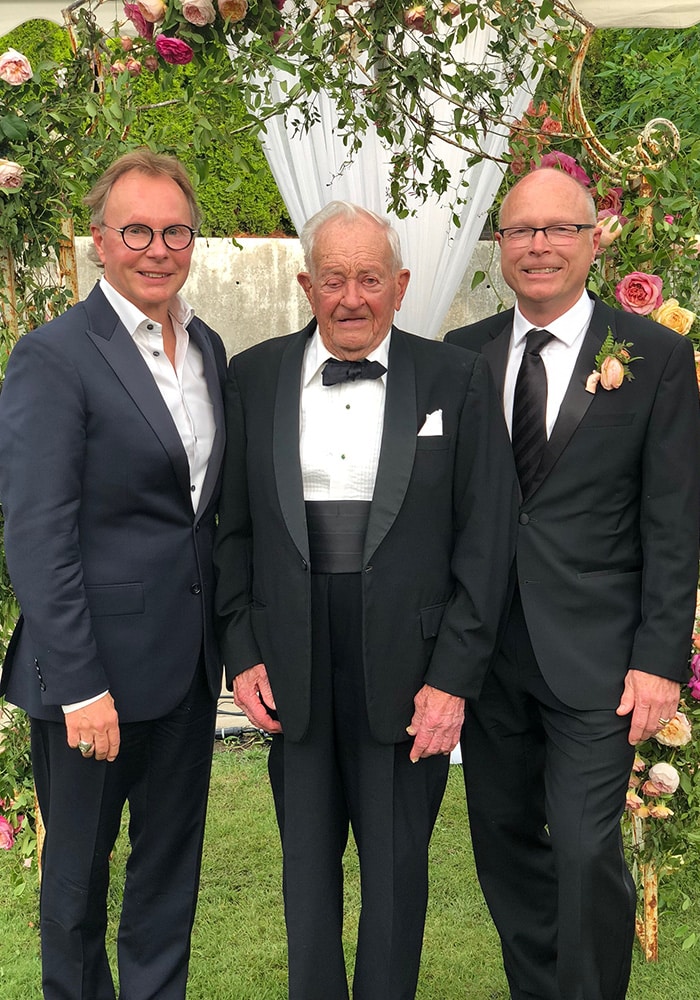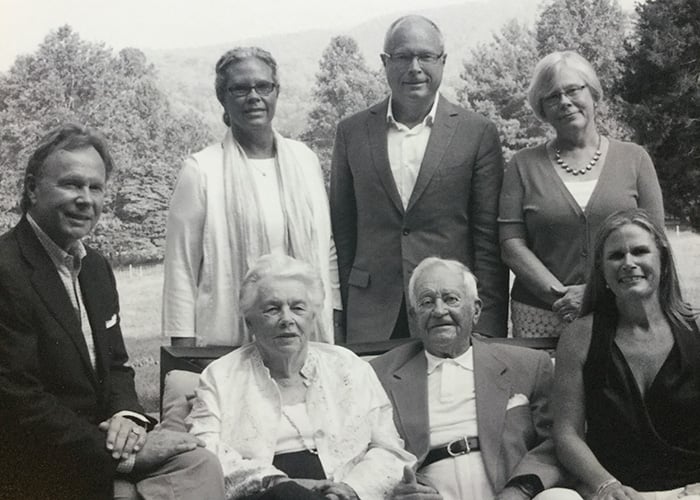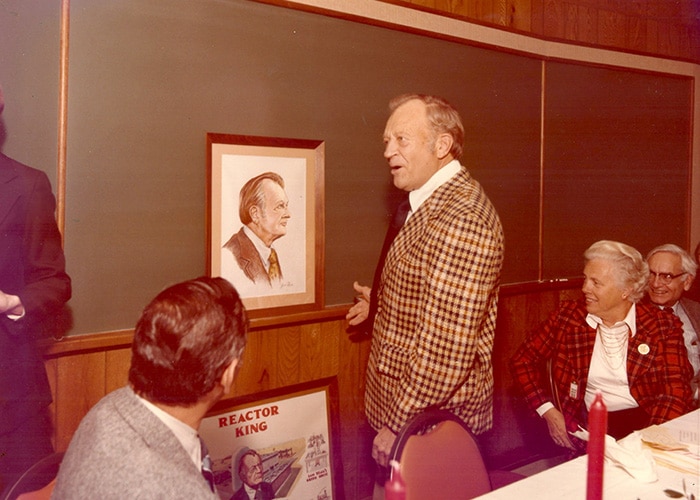
2022 Distinguished Alumnus Award Winner
Samuel Beall II was a man of firsts. The first chemical and industrial engineering student graduate from UT in 1942, Beall joined America’s first effort to create an atomic bomb, the Manhattan Project, shortly after earning his degree.
Around the same time that Beall graduated from UT, a group of influential Americans expressed concerns that Germans may be on the verge of creating a detrimentally powerful weapon. Beall joined DuPont—once the largest chemical company in the world—and was sent to assist with the Manhattan Project at the University of Chicago. He worked on developing smokeless powder and diluting smokestack radioactivity. By 1944, he was back in Tennessee as a technician working on the startup of the graphite reactor at Oak Ridge National Laboratory, where he tested the efficiency of stacks to make sure they would not leak radioactive gas.
To create these early nuclear weapons, plutonium was separated from uranium and the products of a split nucleus, which is what Beall studied at the Hanford site in Washington state following World War II. There he helped craft the second Nagasaki bomb. After the war ended, he returned to Oak Ridge and worked on several more nuclear reactors. He would later serve as Director of the Reactor Division and oversee 93 departments and 270 engineers. He continued his groundbreaking work by organizing the first energy division at ORNL to explore non-nuclear power sources
and retired in 1978.
After retirement, he traveled the world for the US Agency for International Development and advised civilian atomic energy programs in India, Pakistan, South Korea, Iceland, and the Netherlands. Beall was a Fellow of the American Nuclear Society and the author of more than 100 papers and publications. He also served on many boards, including Ruby Tuesday Inc.—a restaurant chain founded by one of his sons; Custom Foods of America Inc.; Office on Aging; and Pellissippi State Technical Community College.
In 2018, Beall received one of the highest awards given by the Boy Scouts of America, the Silver Beaver Award, for his distinguished service as Scoutmaster of Troop 6. He has also provided direct support to industrial engineering students at UT with the Sam and Mary Anne Beall Engineering Scholarship Endowment. The couple also made an endowment to build the Beall Family Rose Garden at UT Gardens, which is home to over 120 different roses and is the largest public rose garden in East Tennessee.
Beyond a lifelong and successful career, Beall spent 71 years with the love of his life, Mary Anne. The couple had five children, 13 grandchildren, and 25 great-grandchildren. Beall could be found playing tennis until the age of 95, fly fishing to age 100, and tending to his garden and greenhouse full of orchids and exotic plants until he was 102. He was an active member of Sequoyah Hills Presbyterian Church and was in attendance whenever possible. Beall, living without assistance, died at his home on April 8, 2022, just one month before his 103rd birthday.
Samuel Beall II was a man of firsts. The first chemical and industrial engineering student graduate from UT in 1942, Beall joined America’s first effort to create an atomic bomb, the Manhattan Project, shortly after earning his degree.
Around the same time that Beall graduated from UT, a group of influential Americans expressed concerns that Germans may be on the verge of creating a detrimentally powerful weapon. Beall joined DuPont—once the largest chemical company in the world—and was sent to assist with the Manhattan Project at the University of Chicago. He worked on developing smokeless powder and diluting smokestack radioactivity. By 1944, he was back in Tennessee as a technician working on the startup of the graphite reactor at Oak Ridge National Laboratory, where he tested the efficiency of stacks to make sure they would not leak radioactive gas.
To create these early nuclear weapons, plutonium was separated from uranium and the products of a split nucleus, which is what Beall studied at the Hanford site in Washington state following World War II. There he helped craft the second Nagasaki bomb. After the war ended, he returned to Oak Ridge and worked on several more nuclear reactors. He would later serve as Director of the Reactor Division and oversee 93 departments and 270 engineers. He continued his groundbreaking work by organizing the first energy division at ORNL to explore non-nuclear power sources
and retired in 1978.
After retirement, he traveled the world for the US Agency for International Development and advised civilian atomic energy programs in India, Pakistan, South Korea, Iceland, and the Netherlands. Beall was a Fellow of the American Nuclear Society and the author of more than 100 papers and publications. He also served on many boards, including Ruby Tuesday Inc.—a restaurant chain founded by one of his sons; Custom Foods of America Inc.; Office on Aging; and Pellissippi State Technical Community College.
In 2018, Beall received one of the highest awards given by the Boy Scouts of America, the Silver Beaver Award, for his distinguished service as Scoutmaster of Troop 6. He has also provided direct support to industrial engineering students at UT with the Sam and Mary Anne Beall Engineering Scholarship Endowment. The couple also made an endowment to build the Beall Family Rose Garden at UT Gardens, which is home to over 120 different roses and is the largest public rose garden in East Tennessee.
Beyond a lifelong and successful career, Beall spent 71 years with the love of his life, Mary Anne. The couple had five children, 13 grandchildren, and 25 great-grandchildren. Beall could be found playing tennis until the age of 95, fly fishing to age 100, and tending to his garden and greenhouse full of orchids and exotic plants until he was 102. He was an active member of Sequoyah Hills Presbyterian Church and was in attendance whenever possible. Beall, living without assistance, died at his home on April 8, 2022, just one month before his 103rd birthday.


